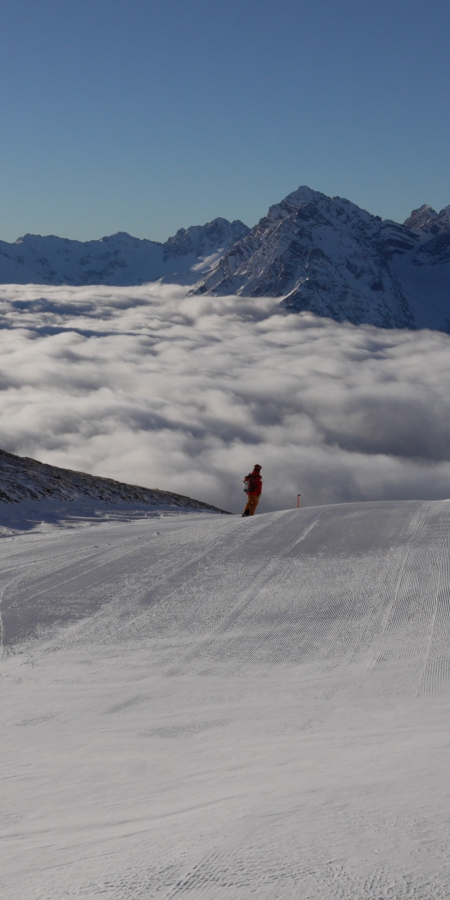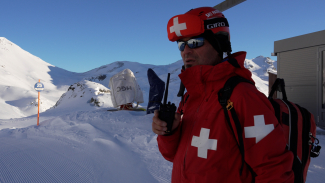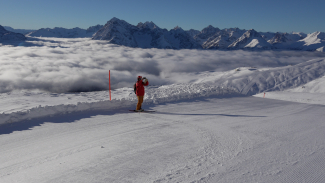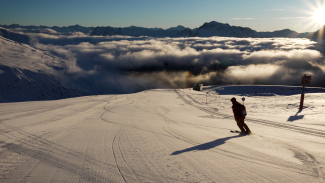Behind the scenes of piste sports
Chasper Planta

Safety on the slopes
He trudges calmly through the snow to the piste machine. «It's windy today,» says Chasper and joins Andri in the tracked vehicle, which takes him to the planned location for the avalanche blasting. For the safety of the guests, these are triggered artificially if necessary, especially if there is a risk of the avalanche sliding into the ski area after heavy snowfall. «There are two ways of detonating avalanches; from a helicopter or with our detonation masts.» Today it's time for the latter, as the weather is still too bad for a helicopter mission. This is just one of the many tasks of the Scuol mountain railway piste team. «Go ahead,» he radios to his work colleague, who triggers the explosive device in the control centre. «Just don't get scared, the bang will come in about 40 seconds». But it remains silent.


Between home and tourism
A dud. This can happen and is not the first time in Chasper Planta's more than 15 years of service. They start a second attempt, which then successfully triggers the detonation. «So, now we're going to mark the last piste,» says Chasper and sets off with one of the workers towards the dream piste Sent, where they place the posts and fences along the piste in cold temperatures, snowfall and strong winds. When asked why he works here, where others go on holiday, he simply says: «This is my home. I like it best here - the mountains, the nature. That's because – perhaps typically Engadin – we have our roots here».

The day is still young
A typical morning for Chasper starts at the snow measurement station on Motta Naluns. There he analyses the snow structures and measures the (new) snow depth. The data is shared with the Institute for Avalanche Research in Davos, where the data from all the other ski resorts is also analysed. Once the first task of the day has been completed, he travels with his team and the first team of lift staff up to their headquarters – the «Mot da Ri» – where the office work awaits.

When he's not on his skis ...
In addition to piste safety and marking, Chasper and his team are also responsible for the rescue service. As is so often the case, there are turbulent and quieter days: «There haven't been any accidents today. There was one yesterday and six the day before. But that has nothing to do with the number of people on the slopes, but rather with the other conditions such as the weather, snow and piste conditions». Together with Lukas, one of his employees, he fills out the accident reports, which are also used for the annual analyses in Bern. On average, there are between 120 and 140 accidents per season in the Motta Naluns ski area. The location of the accident, type of sport, time and much more must be noted for statistical purposes. «Someone in Bern has a lot to do again».

Beauty & peculiarity of mother nature
When the weather is fine, they know that the day will not normally bring any big surprises. «Of course, the heat can also increase the risk of avalanches and trigger wet snow avalanches». On the other hand, in very bad weather and snow flurries, you are constantly reminded that you are out in nature, against which even humans can do nothing. «Everything depends on how we treat nature. Fortunately, there are laws and regulations that we have to comply with. You can't just «move mountains» or build whatever you want. And that's a good thing».
I'm a nature type – and that's just the way it is.
Chasper Planta Head of Safety & Piste Control at the Scuol mountain railways
The love of home
The safety of guests is important to Chasper, and not just because of his current responsibilities. He completed his first training as a mountain guide. «The whole family often goes to the mountains – hiking, mountaineering or for ski tours – and has done so from an early age». Piz Linard is one of his personal favourites. Surrounded by unspoilt nature, Rhaeto-Romanic traditions and tourism-driven value creation – the Lower Engadin attaches great importance to maintaining its livelihood for future generations. «I believe our small, family-orientated region is valued as such by guests. We have many guests, families who have been coming here for generations. That is our bonus».
Text, Video & Bilder: Marina Gachnang



